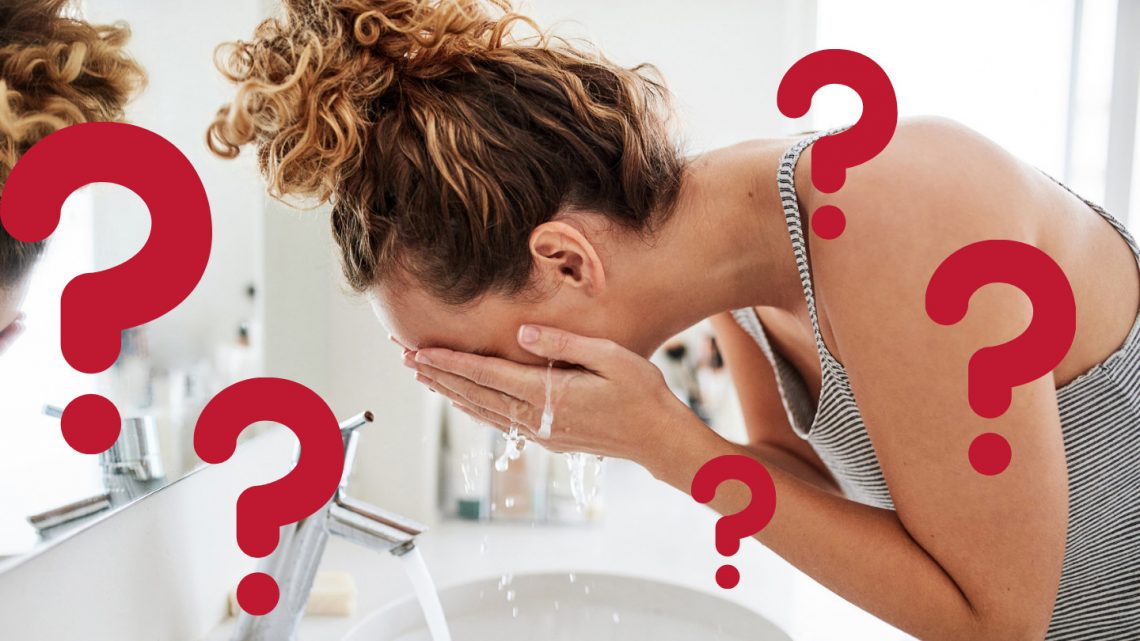
Is Using Dove Bar Soap on Your Face Actually Good? An Investigation
December 30, 2020Amid my soothing stream of Starbucks order hacks and Target hauls (I’m temporarily in the suburbs in Texas, and the TikTok algorithm has not only figured me out, but may actually be leading me to a new personality), I recently noticed a curious new trend in skincare: washing one’s face exclusively with Dove bar soap.
A far cry from the maximalist regimens that have been popularized by detailed Google docs and women’s magazines, etc., the appeal of the Dove soap thing seems to be its extreme simplicity and affordability. Just one product that costs less than $10, and all skin problems—so hypothesized the people on TikTok—would be solved.
It’s a nice premise! I can see how a person might want to try it. If I spend enough time looking at the app, with my personality mid-change, I might even want to try it. Except there’s a problem, which is that the #dovesoapchallenge (a hashtag under which people use exclusively Dove bar soap for a month to see if it will cure their acne and chronic breakouts) is a showcase of failure. Many people give up before the month is complete, their skin remaining the same or even becoming slightly worse than before.
So what's the deal with the Dove bar, and is it as good as some people claim? To get to the bottom of this, I turned to dermatologist Angelo Landriscina, AKA Dermangelo, AKA the self-proclaimed SKINFATHER of TikTok.
To put it simply: “I don’t think the Dove bar itself is a reliable agent for treating acne,” Landriscina told VICE.
Results people might be seeing, Landriscina said, are just a side effect of quitting an excessive, irritating routine with loads of products and switching to something less stripping and aggravating. He added that over-the-counter acne products are often harsh and irritating, and make the skin look worse via inflammation. Quitting those products—whether for Dove bar soap or something else entirely—can cause the skin’s appearance to improve, if only because any inflammation is gone.
“I see trends like this come and go on TikTok all the time,” Landriscina said. “One person claims that a small change made all the difference in their skin (potatoes as a pimple spot treatment, cinnamon for blackheads, turmeric for dark circles, I can go on), said video goes viral and then people all over the world start trying it and documenting their own journey. From what I can tell, a few people posted videos about getting rid of their extensive skincare routines and simplifying to just Dove bar soap and moisturizer. They claimed the results were shocking, so people jumped on the trend and tried it out.”
Landriscina believes the appeal of the challenge, as useless as it seems to be, is its simplicity, and that its simplicity positions big skincare with all its serums and essences as a capitalistic scam. Which isn’t… wrong, but doesn’t necessarily make Dove bar soap right, either.
“I think people are always looking for a quick fix,” Landriscina said. “Not to get too deep, but much of the skincare content on social media can make people feel isolated or inadequate. So why wouldn’t it be attractive to reject all that, throw out your 12-step skincare routine and simplify it down to two or three products?”
For similar reasons, CeraVe products—purchasable at any drug store, and fairly inexpensive in the realm of skincare—have been all over TikTok this year. TikTok, currently the most powerful marketing tool on the plant, eventually led the brand to sell out most of its facial cleansers and lotions at Target, Ulta, and drugstores. . BuzzFeed ran an “I tried it” post on using CeraVe—a product that has been on drugstore shelves for over a decade—as if it’s an exclusive Kardshian-created brand. People were so gaga for it that TikToks were eventually made about the nonexistence of CeraVe on store shelves. The difference, though, between CeraVe and Dove bar soap is CeraVe is dermatologist approved, and carries a line of products that together make up a pretty decent skincare routine.
It feels almost counterintuitive that, in a year with excess time at home and staring at our faces on Zoom meetings all day long, skin care routines would get simpler, and not more extravagant. I’ve been on a fairly minimalist routine for years (cleanser, exfoliant, moisturizer, sunscreen) and, at some point in Q2 or Q3 of the pandemic, started saying out loud to my friends, “I’m going to get really into skincare!” What that looked like was buying one product from Sephora and stocking up on one additional CeraVe thing, a retinol of some sort, but I barely follow the new routine because it turns out facial salves are not necessarily salves for worldwide sickness and chaos. Also my skin is the same as before. Maybe my pores are actually bigger now? We’re all aging rapidly.
I’m no scientist, but I did take the state-mandated number of science classes in high school. As I recall, theories can never be proven but can certainly be disproven. It seems to me that the surfeit of evidence against the #dovesoapchallenge, especially when it comes to curing acne or hormonal breakouts (???), should disprove the theory that using only this product is a miracle cure for all faces. Also, the simple fact of there being no such thing as a miracle cure for all faces should probably disprove this thing, too.
And yet on TikTok, folks persist. I cannot cast judgment, for I have done plenty of things proven by research to be bad for me. An occasional cigarette? That’s nice. Drinking, on special occasions, an entire bottle of wine? Who among us? Using Dove bar soap to cleanse the face for an entire month, to no end? Fine—rock on.
Follow Hannah Smothers on Twitter.

